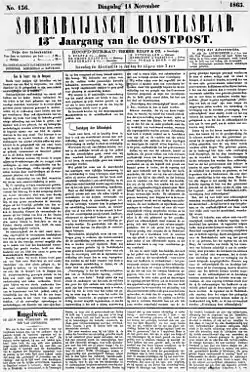Soerabaijasch Handelsblad
The Soerabaijasch Handelsblad ("Surabaya Commercial Paper") was a Dutch-language broadsheet[1] in Surabaya, in what was then the Dutch East Indies. It was published by Kolff and Company.[2]
 Front page, 14 November 1865 | |
| Format | Broadsheet |
|---|---|
| Publisher | Kolff and Company |
| Founded | 1853 (as De Oostpost) |
| Language | Dutch |
| Ceased publication | 1942 |
| Relaunched | 1945–1957 |
| City | Surabaya |
| Country | Dutch East Indies |
| OCLC number | 72769466 |
Newspapers in Surabaya date to 1836, when the Dutch-language Soerabaijasch Advertentieblad was published.[3] Soerabaijasch Handelsblad was established in 1853, under the name De Oostpost ("The Eastern Post"); it was the second newspaper published in Surabaya.[4] Although the initial publication was limited to advertisements, the newspaper eventually began including news and items of general interest, including film[5] and book reviews.[6]
The name was changed in 1865 to Soerabaijasch Handelsblad, which remained in use until the newspaper was shut down in 1942, following the Japanese occupation of the Dutch East Indies.[2] Although for most of its existence the newspaper was dated using the Gregorian calendar, from 17 May to 6 June 1942 (during the occupation, which lasted until 1945) it used the Japanese kōki (皇紀) calendar.[7]
The Soerabaijasch Handelsblad was reestablished in 1945 as the Nieuwe Courant ("New Courant"); through 1946 it was billed as the official newspaper of the Allied Military Administration-Civil Affairs Branch,[8][9] a semi-military organization tasked with restoring Dutch colonial administration and law in the recently proclaimed Republic of Indonesia, which claimed most of the Indies.[10] This publication lasted until 1951, when it was renamed the Nieuw Soerabaiasch Handelsblad.[9][11] The newspaper was ultimately shut down in 1957.[12]
The Dutch newspaper archive Delpher.nl provides access to scans of the Soerabaijasch Handelsblad from two periods, 1865–1908 and 1929–1942. Scanning of this material was completed by the National Library of the Netherlands.[2]
References
- Laffan, Michael (2011). The Makings of Indonesian Islam: Orientalism and the Narration of a Sufi Past. Princeton UP. p. 210. ISBN 9781400839995.
- "Soerabaijasch handelsblad". Delpher.nl. Retrieved 18 May 2014.
- Bosma, Ulbe; Raben, Remco (2008). Being "Dutch" in the Indies: A History of Creolisation and Empire, 1500-1920. NUS Press. p. 205. ISBN 9789971693732.
- Dukut Imam Widodo (2008). Hikajat Soerabaia Tempo Doeloe [The Story of Surabaya in Earlier Times] (in Indonesian). Vol. 1. Dukut Publishing. ISBN 9786028056007.
- See, for instance, "City: Harta Berdarah". Soerabaijasch Handelsblad (in Dutch). Surabaya. 1 November 1940. p. 8.
- See, for instance, "Letterkundig overzicht. Louis Couperus" [Literary Review: Louis Couperus]. Soerabaijsch Handelsblad' (in Dutch). 2 April 1896. p. 1.
- Soerabaijasch Handelsblad. WorldCat. OCLC 72769466.
- "Soerabaiasch Handelsblad". Journalistiek in de Tropen (in Dutch). International Institute of Social History. Retrieved 18 May 2014.
- "Nieuwe Courant (III)". Journalistiek in de Tropen (in Dutch). International Institute of Social History. Retrieved 18 May 2014.
- "NICA, Netherlands Indies Civil Administration". Nationaal Archief. Retrieved 18 May 2014.
- "Nieuwe Courant (IV)". Journalistiek in de Tropen (in Dutch). International Institute of Social History. Retrieved 18 May 2014.
- "Nieuw Soerabaiasch Handelsbla". Journalistiek in de Tropen (in Dutch). International Institute of Social History. Retrieved 18 May 2014.